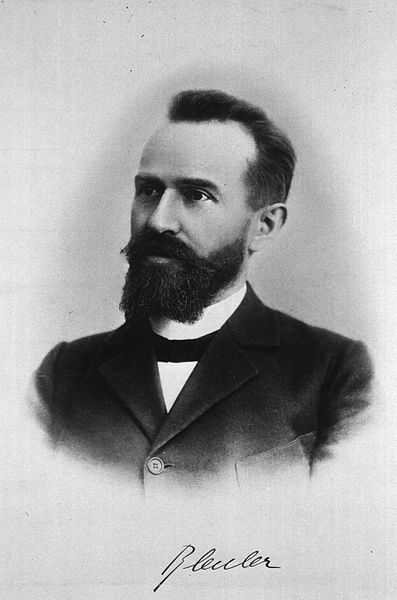<Back to Index>
- Psychiatrist Paul Eugen Bleuler, 1857
PAGE SPONSOR

Paul Eugen Bleuler (April 30, 1857 – July 15, 1939) was a Swiss psychiatrist most notable for his contributions to the understanding of mental illness and for coining the terms "schizophrenia", "autism", and what Sigmund Freud called "Bleuler's happily chosen term ambivalence".
Bleuler was born in Zollikon, a small town near Zürich in Switzerland, to Johann Rudolf Bleuler, a wealthy farmer, and Pauline Bleuler - Bleuler. He studied medicine in Zürich and following his graduation in 1881 he worked as a medical assistant to Gottlieb Burckhardt at the Waldau Psychiatric Clinic in Bern. Leaving this post in 1884 he spent one year on medical study trips to Jean - Martin Charcot in Paris, to Bernhard von Gudden in Munich and to London. Thereafter he returned to Zürich to take a post as an intern at the Burghölzli, a university hospital.
In 1886 Bleuler became the director of a psychiatric clinic at Rheinau, a hospital located in an old monastery on an island in the Rhine. It was noted at the time for being backward, and Bleuler set about improving conditions for the patients resident there.
Bleuler returned to the Burghölzli in 1898 where he was appointed director.
Following his interest in hypnotism, especially in its "introspective" variant, Bleuler became interested in Sigmund Freud's work, favorably reviewing Josef Breuer and Sigmund Freud's Studies on Hysteria. Like Freud, Bleuler believed that complex mental processes could be unconscious. He encouraged his staff at the Burghölzli to study unconscious and psychotic mental phenomena. Influenced by Bleuler, Carl Jung and Franz Riklin used word association tests to integrate Freud's theory of repression with empirical psychological findings. As a series of letters demonstrates (published in English in 2003), Bleuler performed from 1905 a self - analysis with Freud.
However he found the movement Freud was creating over - dogmatic, and resigned from the International Psychoanalytic Association in 1911, writing to Freud that "this 'all or nothing' is in my opinion necessary for religious communities and useful for political parties... but for science I consider it harmful".
He remained interested in Freud's work however, citing him favorably for example in his often reprinted Textbook of Psychiatry (1916), and supporting his claim for the Nobel Prize in the late twenties.
Bleuler successfully introduced the term schizophrenia to replace Kraepelin's term dementia praecox through his seminal study of 1911, Dementia Praecox, oder Gruppe der Schizophrenien. He argued against Kraepelin that schizophrenia was not the product of organic deterioration, and not necessarily incurable.
Instead, he saw its central characteristics to be the product of a process of splitting between the emotional and the intellectual functions of the personality; and favored early discharge from hospital into a community environment to avoid institutionalization.
Bleuler also explored the concept of moral idiocy, and the relationship between neurosis and alcoholism. He followed Freud in seeing sexuality as a potent influence upon anxiety, pondered on the origins of the sense of guilt, and studied the process of what he termed switching (the affective shift from love to hate, for example).
Bleuler was known for his clinical observation and willingness to let symptoms speak for themselves, as well as for his skillful expository writings.